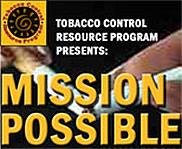New Study shows Hispanics Less Likely to use Medications to Quit Smoking
Hispanic smokers are nearly half as likely as white smokers to have ever used nicotine replacement therapies (NRTs) when trying to quit smoking, according to a recent study published by the American Journal of Health Promotion. The study found 26 percent of Hispanic smokers have never used nicotine replacement therapy as an aid to quitting smoking, compared to the 50 percent of white smokers who have used NRT as an aid in smoking cessation. Currently, 15 percent of all Hispanic adults in the U.S. smoke. The American Legacy Foundation, a national public health foundation devoted to keeping young people from smoking and helping adult smokers quit, says NRT products can play a key role in helping smokers quit successfully. Research has found that the use of the patch, nasal spray or bupropion can double the likelihood of a smoker quitting successfully. Use of the gum or inhaler can also increase smokers' chances of quitting by 50 percent. "Unfortunately, misinformation exists about the use of NRTs," said Dr. Cheryl Healton, president and chief executive officer of the American Legacy Foundation. "Some smokers believe NRTs are harmful to their health, when the tar and the chemicals found in cigarettes are what is most harmful, not the nicotine. Also, some smokers feel NRTs are not effective, when in actuality, smokers sometimes do not use the medication properly and fail to maximize their chances of success." The foundation says people who use a combination of tools - medication, counseling and utilizing a support network, can greatly increase their chances of quitting successfully. Since many Hispanics will attempt to quit smoking as part of their New Year's resolutions, the American Legacy Foundation is offering advice to those trying to quit: 1. Choose to quit: Becoming an ex-smoker is a powerful act. Smokers should commit to quitting by setting a quit date and clearly identifying their reasons for quitting 2.Create a plan: Give yourself at least five days to "get ready" to quit. Your plan should include: Medication: Talk to your doctor about medications that can help you deal with cravings and dramatically boost your chances of quitting successfully. Safe and effective medications, like the patch, lozenges or gum, are available by prescription and over the counter. (Pregnant smokers and those under 18 should consult a doctor before using any medications). Get professional counseling: Find a professional who can help you know what to expect and how to handle tough situations when quitting. Utilize smoking cessation clinics and group support meetings in your community, or take advantage of telephone counseling. You can call 1-800-QUIT-NOW for free counseling anywhere in the country. Get social support: Tell your family, friends and co-workers about your plan to quit so they can help you through the stressful times. When socializing or going out, ask them to spend time with you in smoke-free environments. 3. Keep Trying: Quitting isn't easy, so if at first you don't succeed, try again. Former smokers report trying to quit many times before finally quitting. But by using all of these tools - medication, counseling and support - you can improve your chances of quitting successfully. "Approaching the quit process in a more strategic way by having a proactive plan greatly increases a person's chance for success," said Elmer Huerta, a founding Board member of the American Legacy Foundation and a leading advocate on Hispanic health issues, "It's important for smokers to know that collectively creating a quit plan, using available pharmaceutical aids, seeking support from friends and family, and obtaining some type of smoking cessation counseling can greatly increase their chances of success." Smokers who would like to talk to a professional counselor can get free counseling anywhere in the San Diego County just by calling 1-800-QUIT-NOW. The American Legacy Foundation® is dedicated to building a world where young people reject tobacco and anyone can quit. Located in Washington, D.C., the foundation develops programs that address the health effects of tobacco use through grants, technical assistance and training, youth activism, strategic partnerships, counter-marketing and grassroots marketing campaigns, research, public relations, and outreach to populations disproportionately affected by the toll of tobacco. The foundation's national programs include Circle of Friends®, Great Start®, a Priority Populations Initiative, Streetheory® and truth®. The American Legacy Foundation was created as a result of the November 1998 Master Settlement Agreement (MSA) reached between attorneys general from 46 states, five US territories, and the tobacco industry. Visit http://www.americanlegacy.org/ |
![]()
TEL- 619-427-4111 Email - Health@infooption.com
Salud+HealthInfo is for information and educational purposes only. You should not rely on this information as a substitute for personal medical attention, diagnosis or hands-on treatment. If you are concerned abut your health or that of a child, please consult your family's physician or health provider immediately and do not try to diagnose yourself.
Salud+Health Info is published and distributed free of charge by Info Option Network (ION) Publishing Company. All rights reserved. ION reserves the right to edit all information provided to the publisher as it deems necessary with regard to legal, public health, State, Federal, International other standards for the proper publishing of this periodical. We reserve the right to refuse articles and advertising at any time. No reproductions of this magazine by any means are permitted without the express written consent of ION Publishing Company. ION has no affiliation with any health organization or political group. ION is not responsible for the claims of advertisers, or the variety of submitted written articles.
Copyright © 2001-2006 Info Option Network
 info
info

